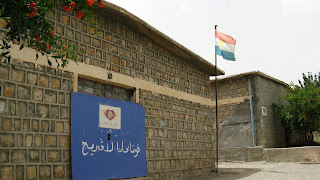Perhaps my previous posts and photographs misled you. Not everything here is bright and beautiful.
During my first week in Dohuk, I awoke one morning to what I thought was fog. (Sewanee fog!) But it was so hot and dry. It was a blanket of dust. Since then, I've experienced three dusty days like this one. My eyes are dry and itchy. It could be my imagination, but I tend to feel more sluggish when we have this dusty weather. When I ask people to explain the dust, they offer a variety of ideas.
"It didn't start until 2003," one young woman told me. "The occupation [coalition forces] stirred up all the dust moving their tanks around."
I found that a little hard to believe. In Baghdad, maybe, but all the way up north?
"It's climate change," another person told me. "All the deforestation from the time of Saddam until now has caused the land to become drier and dustier."
That seemed more reasonable. Other sources, like this news article (http://www.kurdishglobe.net/display-article.html?id=0C5FA83E2340146AC008B118C606B393) attribute the dust to weather patterns from the Arabian peninsula. Whatever the origin, the dust is causing respiratory problems for many people: (http://pukmedia.co/english/77/kurdistan-region/880-dust-storm-blankets-kurdistan-region-cities )
A dusty day like this makes me feel "like a lonely sparrow on the housetop." Or a pigeon in this case.
During my first week in Dohuk, I awoke one morning to what I thought was fog. (Sewanee fog!) But it was so hot and dry. It was a blanket of dust. Since then, I've experienced three dusty days like this one. My eyes are dry and itchy. It could be my imagination, but I tend to feel more sluggish when we have this dusty weather. When I ask people to explain the dust, they offer a variety of ideas.
"It didn't start until 2003," one young woman told me. "The occupation [coalition forces] stirred up all the dust moving their tanks around."
I found that a little hard to believe. In Baghdad, maybe, but all the way up north?
"It's climate change," another person told me. "All the deforestation from the time of Saddam until now has caused the land to become drier and dustier."
That seemed more reasonable. Other sources, like this news article (http://www.kurdishglobe.net/display-article.html?id=0C5FA83E2340146AC008B118C606B393) attribute the dust to weather patterns from the Arabian peninsula. Whatever the origin, the dust is causing respiratory problems for many people: (http://pukmedia.co/english/77/kurdistan-region/880-dust-storm-blankets-kurdistan-region-cities )
A dusty day like this makes me feel "like a lonely sparrow on the housetop." Or a pigeon in this case.






















































